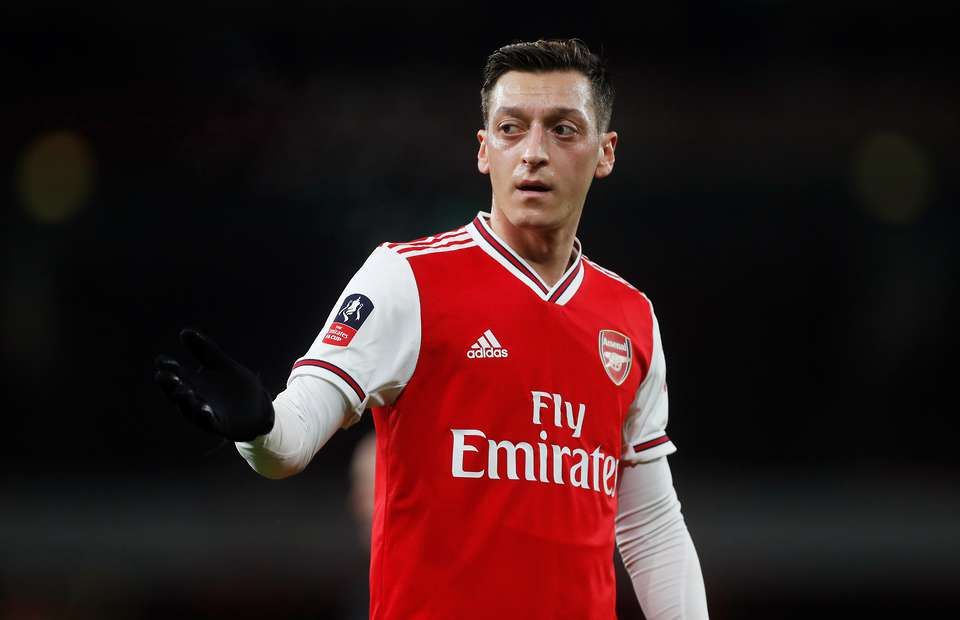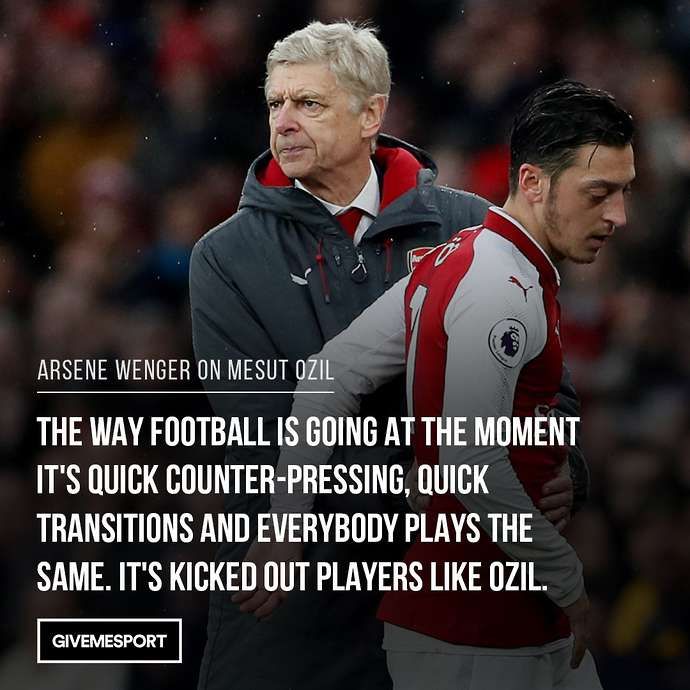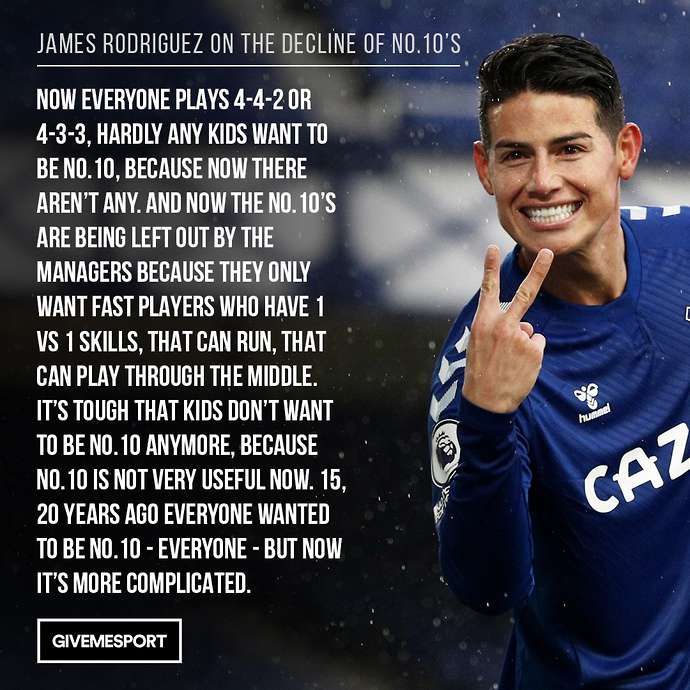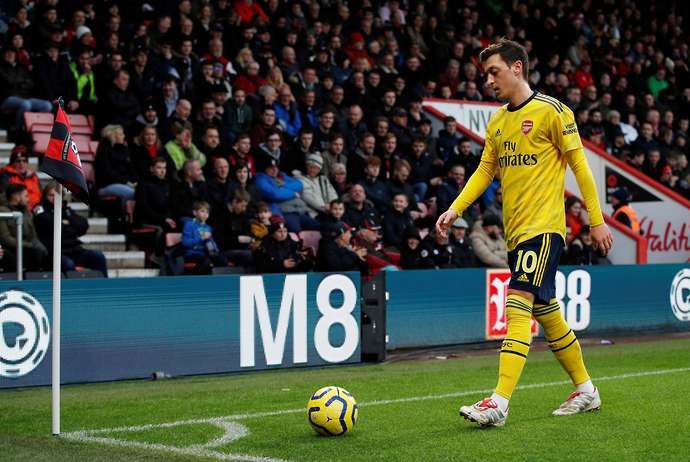Mesut Ozil is without doubt one of the most naturally gifted footballers of his generation.
Compared to Lionel Messi and Zinedine Zidane, described as “technically perfect” by Ruud Gullit and “unique” by Jose Mourinho, rarely does European football produce a player with the ability to amaze so effortlessly, to glide through congested midfields while barely leaving a trace on the grass below him, to create gorgeous goals through the sheer ingenuity and complexity of his passing, to find the net himself through ghostly movement and the most delicate of finishes. At points in his career, Ozil has operated at an entirely different level to most of his midfield contemporaries.
And yet, as the turn of his 32nd birthday marks the entry into a period of his career in which retirement begins to loom like a dark cloud of inevitability, there is a feeling that he’ll be remembered as much for his misgivings as his incredible talent and likewise achievements, chief among those being winning La Liga with Real Madrid during the height of Barcelona’s dominance and lifting the World Cup with Germany in 2014.
Fast forward six years from glory in Brazil and the attacking midfielder has become far more synonymous with negative connotations, perhaps the most stark being his seeming contentment to see out an Arsenal contract that pockets him £350k per week despite being ostracised entirely by the club’s last two managers, Unai Emery and Mikel Arteta. Work-shy, absent in big games and physically limited have become likewise sticks to beat him with.
But has Ozil really changed that much, or has the world changed around him? After all, what is work-shy if not a pejorative interpretation of effortlessness? What is ghostly if not somewhat absent? And what is delicate if not a lack of strength and power? This may seem a bizarre instance in which to bring up Adolf Hitler, but there is an interesting comparison, nonetheless.
Historian Laurence Rees argues that the idea of Hitler being a naturally charismatic leader as often assumed is somewhat misguided. Hitler was always a ranting bigot and for much of his early adult life he was treated as such - seen as the reactionary buffoon in the corner of the pub spouting nonsense to whoever listened.
But after the loss of World War 1 and the economic impact of The Great Depression, suddenly those ill-thought monologues were interpreted as daring, bold and truthful, the sheer aggression behind his ignorance becoming galvanizingly charismatic. Hitler was Hitler from the cradle to the grave; but the context he was surrounded by drastically changed, and perceptions of him changed with it. Once a homeless failed artist, he rose to become the greatest tyrant in the history of mankind.
And thus, here lies the crux of how opinions on Ozil have transformed for the worse throughout the latter half of his career, climaxing to a point today where he is judged more as a financial burden than a footballing blessing. Ozil’s inevitably a little slower, a little less energetic and perhaps a little less hungry than he was in his early years, but the bigger problem is how the rest of the game has evolved to ultimately leave him behind. This is precisely the verdict his former manager, Arsene Wenger, recently issued when asked about Ozil by BBC Sport...
And the supporting evidence is there to see. When Wenger brought Ozil to the Emirates stadium in 2013, the Gunners and practically every top club in the Premier League set up their sides in 4-2-3-1 formations, essentially creating whole systems to have a creative No.10 at its beating heart, largely free of defensive responsibility upon the proviso that their attacking contributions would outweigh anything they could offer out of possession.
Chelsea had Juan Mata and Oscar, Manchester City boasted David Silva, Manchester United were now playing Wayne Rooney behind Robin van Persie and Tottenham gave license to Gareth Bale to play a completely free role behind a central striker. Liverpool were still experimenting under Brendan Rodgers, but he used 4-2-3-1 at points in the 2012/13 campaign as well, fluctuating between Nuri Sahin, Philippe Coutinho and after the January arrival of Daniel Sturridge, Luis Suarez.
But within a few years, the tactical landscape of the Premier League had been flipped upside down. Leicester City won the title almost exclusively using 4-4-2, Antonio Conte’s arrival at Chelsea triggered the emergence of 3-4-3, and the appointments of Pep Guardiola and Jurgen Klopp at City and Liverpool respectively have gone on to re-establish 4-3-3 as the predominant setup throughout the Premier League.
Positionally speaking, out-and-out central No.10s like Ozil were made increasingly redundant and changes in style of play towards a much greater emphasis on speed on the counter-attack and energy from the front only exacerbated the trend, turning a type of player once deemed essential for every team into an expendable luxury.
It’s not only Wenger who believes as such either. James Rodriguez - who makes a very interesting case study in himself through the sheer fact he’s had to swap Real Madrid and Bayern Munich for Everton to guarantee regular playing time - recently issued a similar critique on his own position.
Now, one question does remain and it is a particularly poignant one. Yes, football has changed since Ozil’s arrival in the Premier League seven years ago, but why hasn’t he changed with it? Silva, for example, managed to maintain his effectiveness in a roaming No.8 role at Manchester City. Coutinho has spent long portions of his career operating as a left winger that cuts inside, and the aforementioned Rodriguez has already produced three goals and two assists in the Premier League by peeling into central positions from Everton’s right flank. Why hasn’t Ozil been able to adapt in the same way?
Well, it must be said that not every No.10 has managed such a transition - there have been other casualties too. Just look at Mata’s decline into irrelevance at Manchester United, Oscar’s Chelsea exit to China, or the plight of Henrikh Mkhitaryan who excelled all across the attacking midfield berth at Dortmund but struggled for any impact as a predominant right winger at Arsenal. In part, it comes down to how naturally versatile a player is - whether they have the athletic ability to play out wide, or the discipline to line up deeper. In that respect, Ozil has always been somewhat limited.
But of course, such transitions are influenced by character too, and perhaps that’s the fairest criticism of Ozil at this stage in his career. To what extent has he ever shown a willingness to change? At least to the naked eye, it’s always appeared that Ozil has only ever wanted to play the game his way, focusing on his greatest strengths rather than trying to polish his weaknesses.
When you’re as talented as the 92-cap German international, in some ways such a mindset is understandable. But at some point there needs to be an element of give and take, and for what Ozil seemingly took in privilege during the first half of his career, he hasn’t done a great deal of giving back in the second.
For the benefit of the neutrals, hopefully there is some form of Ozil swansong - a move to a club where playing a now-old-fashioned style of No.10 is worth the trade-off of immense creativity for more pressure on this playing behind him. It would be fantastic to see the former Werder Bremen man rediscover the footballing context that allowed him to once so greatly thrive.
But as is often the case in football, money stands in the way. Ozil’s on a massive contract and this will probably be the last time in his career that such earnings are offered to him. He’ll argue that if Arsenal no longer have a use for him, they shouldn’t have granted him such favourable terms - and let’s not forget, this bumper deal was only handed to him 18 months ago.
Regardless, if there’s one lesson to be learned from the trajectory of Ozil’s career, it is surely this - while talent and attitude are fundamental criteria for reaching the very top of the game, tactical relevance can be crucial for staying there. Whereas others have managed to keep up with changes in the modern game, the Arsenal man has slowly allowed himself to be left behind.




















